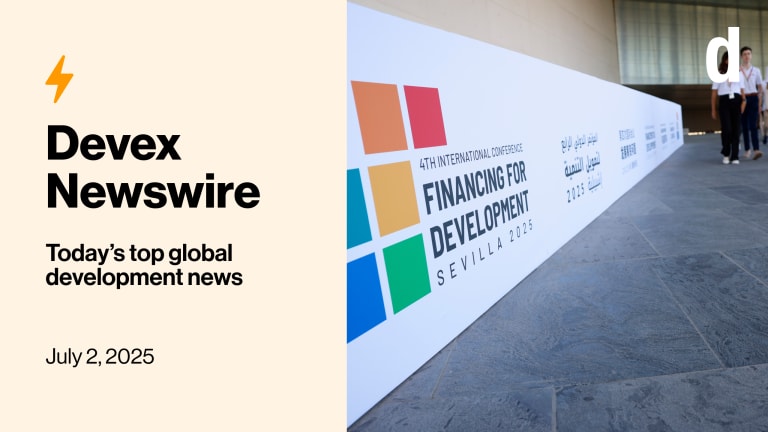Hope for Spanish multilateral grants
Spain's voluntary contributions to multilateral initiatives have dropped significantly since 2012, mainly as a result of austerity measures implemented that year. Could upcoming elections usher in not just a new administration, but also a change in development policy?
Over the next few weeks, Spain will be releasing its new strategy on refundable aid for 2015-16. This blueprint will allow the Fund for Development Promotion — known as Fonprode — to be able to strategically and effectively allocate development loans and equity investments. A Spanish development cooperation financial instrument that replaced the Development Aid Fund, Fonprode was designed to facilitate disbursements not just of voluntary contributions to multilateral and global initiatives and organizations, but also refundable development loans and capital investments to low- and middle-income countries. It manages equity investment funds as well. Launched in 2011, Fonprode disbursed up to 290 million euros ($329.9 million) to multilateral institutions that year — the only time it was able to channel such a large amount to such initiatives and organizations. The Spanish economy was among those hit hard by the global financial crisis, leading the government to implement austerity measures. Among them was a markedly reduced budget for Fonprode, which eventually had only 67 million euros of its proposed 125 million euros grants allocation approved for 2012. Since then, Fonprode’s entire budget — 385 million euros ($438.8 million) in 2013 and 375 million euros for both 2014 and 2015 — has been earmarked only for refundable loans and equity investments. Unlike grants, refundable development assistance has little impact on the government’s balance sheet, Pablo José Martinez, coordinator of the Spanish development nongovernmental organization platform Plataforma 2015 y más, explained to Devex. But this preference for refundable aid, Martinez stressed, has led “to an extraordinary breakdown of Spain’s multilateral ODA spending.” Sharp decline in multilateral contributions Compared with other European countries that had to reduce their aid budgets, Spain implemented extraordinarily deep cuts to its development assistance envelope — the largest among donors in the region. From being the sixth-largest donor among members of the Development Assistance Committee of the Organization for Economic Cooperation and Development in 2009, Spain saw its ranking plummet to 15th place in 2013. Spanish ODA has actually dropped 70 percent since the start of the financial downturn. From a net ODA spending of 4.73 billion euros (0.46 percent of gross national income) in 2009, the current development budget has been kept to about 1.8 billion euros — or roughly 0.17 percent of GNI — since 2013. The government, led by Prime Minister Mariano Rajoy, justified the steep drop in Spanish development assistance by saying the country had to strategically streamline its aid program and focus on sectors and geographic areas where it could have the greatest impact. Instead, these cuts led to significantly diminished voluntary contributions to multilateral organizations and global initiatives. Excluding compulsory contributions to the European Union and international finance institutions, funding to multilateral initiatives plummeted 91 percent from 1.45 billion euros in 2009 to 127 million euros in 2014. As 86 million euros of this amount consisted of obligatory payments to U.N. agencies, voluntary spending to multilateral initiatives dropped to just 41 million euros, according to government estimates. The Global Fund to Fight AIDS, Tuberculosis and Malaria is among those that fell victim to Spain’s cuts on multilateral contributions. The European donor pledged 424 million euros to the global initiative from 2008 to 2010, but has not renewed support since. Notably, some experts have backed this move by the government, arguing that it is more sensible to cut multilateral funding managed by Fonprode than other grant-related envelopes given budgetary constraints. Íñigo Macías, independent consultant and professor at the Barcelona Institute for International Studies, even said reductions to these multilateral instruments came as a result of unsustainable increases to their allocations in the past. “Multilateral ODA allowed Spanish development officials to easily allocate a huge volume of funds” that Spain would not been able to disburse otherwise, Macias noted. Further, he pointed out that the Spanish development cooperation program did not have the adequate tools to manage, evaluate and follow up on Fonprode spending, making it difficult to objectively assess the value of multilateral aid. Because of these changes, Fonprode’s mandate has evolved to focus exclusively on refundable financial operations. Fonprode reform a ‘missed opportunity’ Despite Fonprode’s new mandate, however, refundable gross ODA only amounted to 46 million euros in 2012 and 19 million euros in 2013 — which hardly made a dent in the financial instrument’s budget for those years. To accelerate disbursements of refundable financial operations, the government approved an administrative reform of Fonprode in early 2014. This resulted in the country’s development finance institution, Cofides, taking part in the decision-making process at Fonprode. This reform, however, was a “missed opportunity,” according to Antoni Picó, spokesman at the Congress of Deputies’ Development Committee for the Catalan group. For one, Fonprode’s administrative reform was debated in parliament’s economic — not development — committee. The financial instrument’s future was not thoroughly discussed as well, thereby eliminating any chance to resume voluntary multilateral grants. Rajoy’s government has publicly embraced a value-for-money approach and a desire to boost the effectiveness of its development program. But Martínez and Macías believe the quality of Spanish aid is likely to decline with the increased focus on refundable spending and a persistent neglect of multilateral ODA, which according to the two experts, “is one of the most effective channels to meet development goals.” While the situation is not likely to change soon, given the current government’s position on voluntary multilateral grants, general elections late this year might usher in a change in policy. Recent polls suggest the country’s fledgling left-wing political party Podemos, or We Can, is likely to shake up the composition of the next parliament. As a result, no political party, not even the ruling conservative People’s Party, will win absolute majority, according to the election surveys. Should this happen, there will then be room to introduce and lobby for policies overlooked by the current center-right administration — including the much-hoped-for resumption of multilateral voluntary spending on global health and development initiatives. What are the chances of Spain resuming voluntary contributions to multilateral organizations and global initiatives? Have your say by leaving a comment below. Check out more insights and analysis for global development leaders like you, and sign up as an Executive Member to receive the information you need for your organization to thrive.
Over the next few weeks, Spain will be releasing its new strategy on refundable aid for 2015-16. This blueprint will allow the Fund for Development Promotion — known as Fonprode — to be able to strategically and effectively allocate development loans and equity investments.
A Spanish development cooperation financial instrument that replaced the Development Aid Fund, Fonprode was designed to facilitate disbursements not just of voluntary contributions to multilateral and global initiatives and organizations, but also refundable development loans and capital investments to low- and middle-income countries. It manages equity investment funds as well.
Launched in 2011, Fonprode disbursed up to 290 million euros ($329.9 million) to multilateral institutions that year — the only time it was able to channel such a large amount to such initiatives and organizations.
This story is forDevex Promembers
Unlock this story now with a 15-day free trial of Devex Pro.
With a Devex Pro subscription you'll get access to deeper analysis and exclusive insights from our reporters and analysts.
Start my free trialRequest a group subscription Printing articles to share with others is a breach of our terms and conditions and copyright policy. Please use the sharing options on the left side of the article. Devex Pro members may share up to 10 articles per month using the Pro share tool ( ).
Ernest Aibar works as independent consultant on global health and development affairs. Based in Barcelona, Spain, he provides intelligence and strategic guidance to multilateral institutions, public-private partnerships and foundations. Over the last 10 years Ernest has acquired a genuine understanding of Spain’s development and public health policies as well as on public relations, advocacy and communications. Ernest holds a master's in international relations, security and development.








